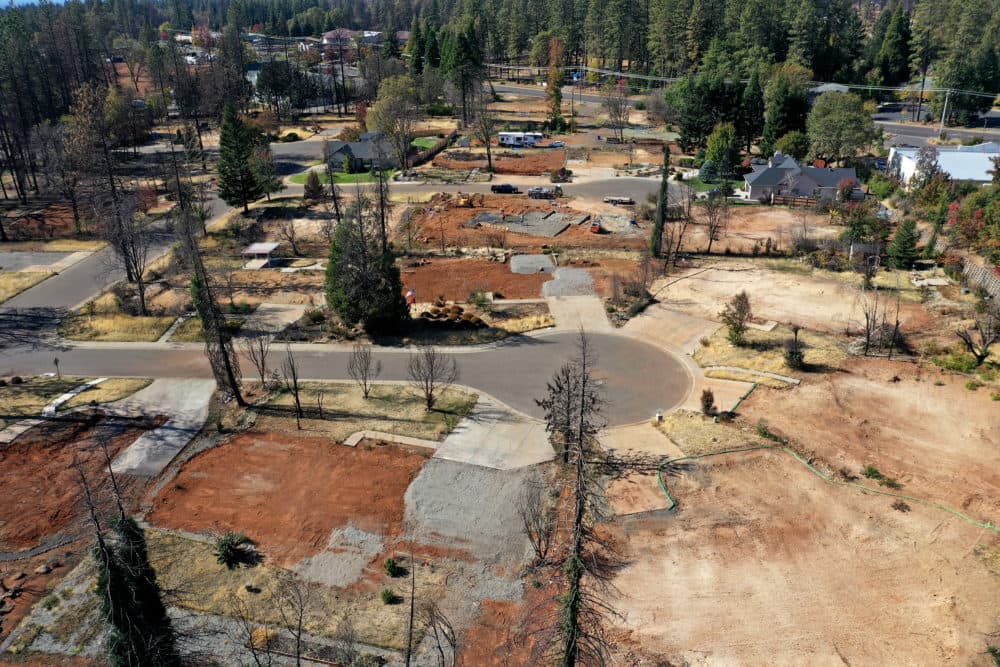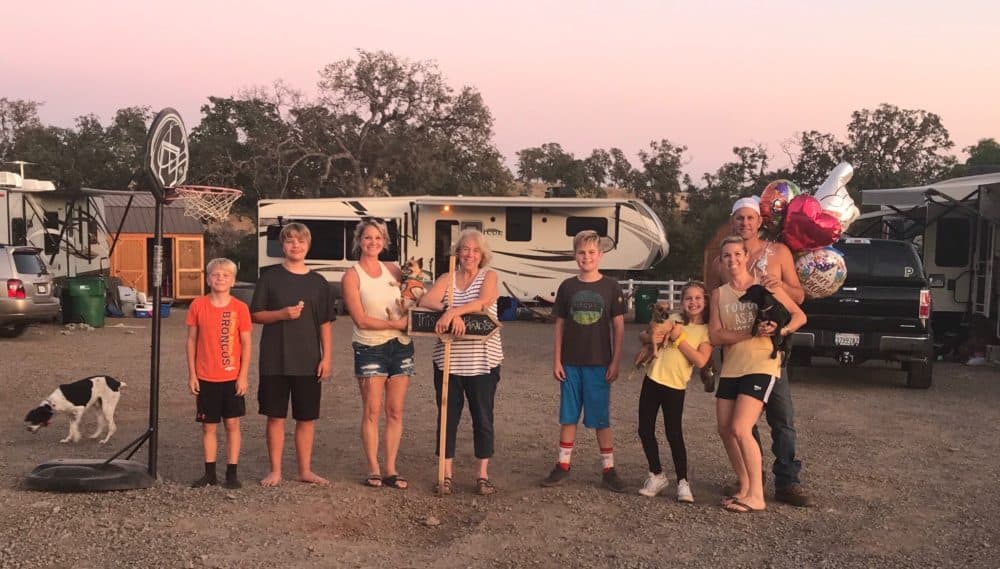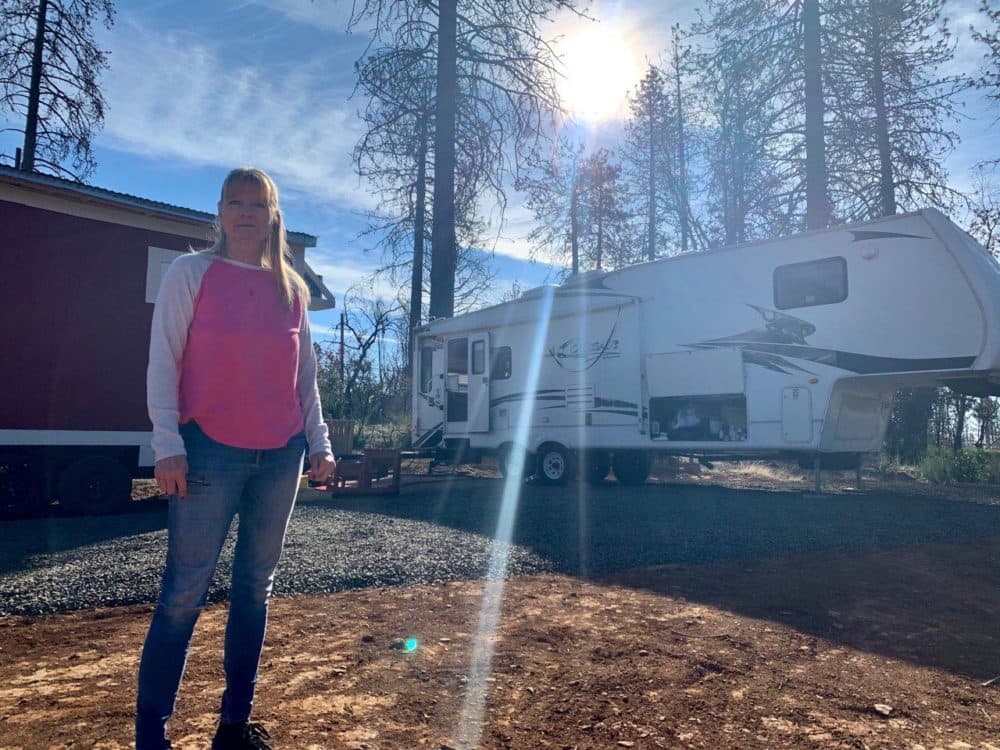Advertisement
Finding Home In Paradise A Year After The Camp Fire Devastated The California Town

One year ago, the Camp Fire raced through Paradise, California, destroying 95% of the town.
When the fire began to ravage Paradise, residents scrambled to escape and crowded the intersection of Skyway and Clark Roads. At its peak, the fire spread more than a football field per second. Homes burned to the ground, and 85 people were killed.
Days after the horrific fire, resilient survivors made their voices heard with the words #ParadiseStrong — a kind of rallying cry to the world.
Those survivors are still working to rebuild their lives one year later. One of them is 57-year-old Tina Balasek, who says she doesn’t want any sympathy.
Paradise is her home, and Balasek says she can’t see herself living anywhere else.
“My grandparents lived here ... both sets of grandparents and my parents grew up here, and I married my high school sweetheart,” Balasek says. “I’ve been to beautiful places, but I can’t imagine giving this up.”
But Balasek, like thousands of her neighbors, was forced to give up the Paradise they knew last year, when the Camp Fire tore through the town.
On the morning of Nov. 8, while raking leaves in front of her home, Balasek got a call from her daughter three hours away in San Francisco telling her that she needed to evacuate. Still in her pajamas, Balasek spent hours in her car frantically trying to get out and watching helplessly as fire tore through her neighbors’ homes.
Some of those neighbors died. Feeling hopeless and certain she was going to die, Balasek decided to make some calls.
“I was able to talk to all three of my kids and propane tanks were blowing up around me,” she says. “And I’m saying, ‘I’m sorry I’m not going to get to watch Jackson grow up. I love you. I’m so so sorry I didn’t get to spend more time with you guys.’ ”
Advertisement
Balasek recently bought a plot of land in Paradise with her Federal Emergency Management Agency money and a trailer she bought just a week ago sits on it. She describes herself as “brave as hell” for coming back and rebuilding.
“And scary and of course, I’m still not comfortable here, and every time there’s wind … anxiety just builds in your gut constantly,” Balasek says.
Most of the hollow, burned-out structures have been torn down, and if you look closely, you can see the tree trunks in this wooded town are black and not brown.
The town of Paradise has received more than 450 building permit applications, and so far, only 11 homes have actually been rebuilt.
Balasek says she has confronted these logistical headaches of rebuilding. She hasn’t even applied for a permit yet, and she says she will be staying in her trailer until she can save up enough money.
“It’s in my blood,” Balasek says of Paradise. “I raised my babies here and fell in love here, and all of the pros of my life, the pluses happened here, and the sadness here and I grieved it and I grew and I survived here.”
Carrie Stratton says she feels the same way.
The 41-year-old mother of two was also born and raised in Paradise, and for the last year she, her two children and her husband have lived in a trailer next to the plot of land where their old home once stood. She calls where they live now “the compound.”
“The compound is three trailers ... pretty much camping,” she says. Her son, Tanner Stratton, says he’s “getting used to it.”
The trailer is nothing special. It’s small and a little cramped, but every morning, the Strattons get to look out their trailer window — and see their new house being built.
“It’s amazing … I’m looking forward to it a lot,” Tanner Stratton says. “It will be awesome.”
Carrie Stratton says they hope to move in by April.
“We are somewhat of pioneers of the new Paradise,” she says. “And the people who are coming back, like it gives me goosebumps, we have a heartfelt want to be here.”

On the day of the fire, Carrie Stratton and her best friend Christy Voigt raced to save each other — Voigt’s two boys, Carrie Stratton’s two children and a few belongings.
After all was clear, they settled together on this plot of land with three trailers, including Voigt’s mother Carole Gilbert, who also lost her home.
Just last week, Voigt and her mother Gilbert closed on the property right across the street from Carrie Stratton. Gilbert says the decision to live so close to each other permanently happened one night sitting in their lawn chairs over a fire.
“And suddenly, the three of us women were sitting there one night — the old lady and the two young ones — and looked at each other and said, ‘We can’t live without each other!’ ” she says. “We had lived here together, and we’re closer than families. And so here we all are, we’re gonna be there and they’re here, and it makes me cry of happy tears.”
People are also learning new lessons in rebuilding Paradise.
New building code requirements have been enacted to help lessen the rapid spread of wildfire. The old wooden houses that easily caught fire are gone, and the town now requires wood and debri near homes is cleared.
Carrie Stratton says she sees these changes as positive.
“As a community, I think we can really lead the force though and make sure that we’re prepared, and this doesn’t happen to us again, or kind of lead the way so that it doesn’t happen to another town,” she says.
There’s also the reality that a year later, there are less people who live in Paradise now.
In some parts of town, people still can’t drink the tap water. So many businesses where people worked are gone. There used to be several dental offices in Paradise, but now there’s only one.
And some people will never be coming back. Christopher Kerr moved three hours west near the Russian River.
“I will never go to Paradise again. I will never drive up there, again,” he says. “I’ve already seen one house burn down. I don’t want to go up and see the whole town burnt down because it’s never going to be completely rebuilt like it was before.”

The Camp Fire in Paradise was the second time Kerr lost everything in a wildfire. The first time was in the Tubbs Fire in Santa Rosa the year before.
“I actually watched the fire march down the bridge above my house. I had probably 15-20 minutes [to get out],” Kerr says. “And then I decided I would move to somewhere where it was more affordable. Santa Rosa is not very affordable, so I moved to Paradise. Whoops.”
His home was destroyed along with his sister and niece’s house.
And just this year, he had to evacuate from his new home because of the Kincaid Fire. His house was spared, but if another wildfire forces him to flee yet again, Kerr says he plans to move out of California.
“I call myself the poster child for climate change,” he says. “I mean, we always deal with forest fires, but not urban forest fires.”
These fast moving wildfires are a horrifying new normal that leave survivors left to figure out not only where, but how to live.
That’s a big struggle for Balasek. She doesn’t want people to feel sorry for her, but it’s tough.
“I have a lot of determination to go forward, and then days where I’m just so tired, and I think, ‘Why me? Why not me? Why am I here? Why are they not? I want to go home,’ ” she says. “Every other thought is, ‘I just want to go home.’ It’s priceless what we imagine home to be, sitting on our deck at the end of a day, on our swing that we splurged on, and have our glass of wine or morning coffee, and know that we’ve done our day good and have helped somebody. That’s gone. Now it’s all about … this isn’t even my property. But I’m gonna try.”
A year later, life in Paradise is far from where or what it was before the fire. But through the determination and grit of the people who still live here, they’re trying to turn it into something new — trying to make it home again.
Cristina Kim produced and edited this interview broadcast. Samantha Raphelson adapted it for the web.
This segment aired on November 7, 2019.

